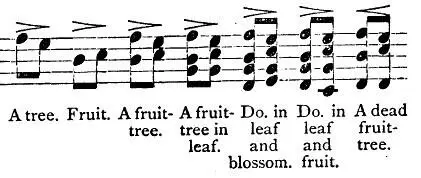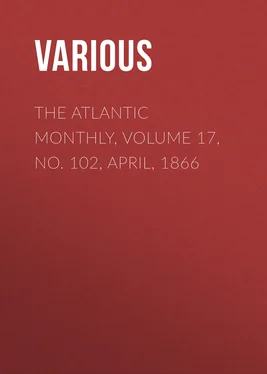Various - The Atlantic Monthly, Volume 17, No. 102, April, 1866
Здесь есть возможность читать онлайн «Various - The Atlantic Monthly, Volume 17, No. 102, April, 1866» — ознакомительный отрывок электронной книги совершенно бесплатно, а после прочтения отрывка купить полную версию. В некоторых случаях можно слушать аудио, скачать через торрент в формате fb2 и присутствует краткое содержание. Жанр: foreign_antique, periodic, foreign_edu, на английском языке. Описание произведения, (предисловие) а так же отзывы посетителей доступны на портале библиотеки ЛибКат.
- Название:The Atlantic Monthly, Volume 17, No. 102, April, 1866
- Автор:
- Жанр:
- Год:неизвестен
- ISBN:нет данных
- Рейтинг книги:5 / 5. Голосов: 1
-
Избранное:Добавить в избранное
- Отзывы:
-
Ваша оценка:
- 100
- 1
- 2
- 3
- 4
- 5
The Atlantic Monthly, Volume 17, No. 102, April, 1866: краткое содержание, описание и аннотация
Предлагаем к чтению аннотацию, описание, краткое содержание или предисловие (зависит от того, что написал сам автор книги «The Atlantic Monthly, Volume 17, No. 102, April, 1866»). Если вы не нашли необходимую информацию о книге — напишите в комментариях, мы постараемся отыскать её.
The Atlantic Monthly, Volume 17, No. 102, April, 1866 — читать онлайн ознакомительный отрывок
Ниже представлен текст книги, разбитый по страницам. Система сохранения места последней прочитанной страницы, позволяет с удобством читать онлайн бесплатно книгу «The Atlantic Monthly, Volume 17, No. 102, April, 1866», без необходимости каждый раз заново искать на чём Вы остановились. Поставьте закладку, и сможете в любой момент перейти на страницу, на которой закончили чтение.
Интервал:
Закладка:
I was, myself, particularly interested in investigating the Martial language, which differs entirely from our terrestrial tongues in not being articulate. Each of the six lateral mouths of these curious men is capable of sounding only one vowel, and of varying its musical pitch about five or six semitones. Thus, their six mouths give them a range of two and a half or three octaves. The right-hand lowest mouth is lowest in pitch, and gives a sound resembling the double o in moon ; the next lowest in pitch is the lowest left-hand mouth, and its vowel is more like o in note . Thus they alternate, the highest left-hand mouth being highest in pitch, and uttering a sound resembling a long ee . The sound of each of the six is so individual, that, before I had been there six months, I could recognize, even in a stranger, the tones of each one of the six mouths. But they seldom use one mouth at a time. Their simplest ideas, such as the names of the most familiar objects, are expressed by brief melodic phrases, uttered by one mouth alone. Closely allied ideas are expressed by the same phrase uttered by a different mouth, and so with a different vowel-sound. But most ideas are complex; and these are expressed in the Mavortian speech by chords, or discords, produced by using two or more mouths at once. A few music types will illustrate this, by examples, better than any verbal description can do.

The signification of these chords is by no means arbitrary; but, on the contrary, their application is according to fixed rules and according to æsthetic principles; so that the highest poetry of these people becomes, in the very process of utterance, the finest music; while the utterance of base sentiments, or of fustian, becomes, by the very nature of the language, discordant, or at best vapid and unmelodious.
It will readily be imagined that I was a very long while in learning to understand a speech so entirely different in all its principles from our earthly tongues. And when I began to comprehend it, as spoken by my new friends, I was unable, having but one mouth, to express anything but the simplest ideas. However, I had Yankee ingenuity enough to supply in some measure my want of lateral mouths.
My captor daily allowed me more and more freedom, and at length permitted me to wander freely over the whole island, simply taking the precaution to send a boy with me as a companion and guide, in case I should lose my way. In one of these rambles I discovered a swamp of bamboos, and by the aid of my pocket-knife cut down several and carried them home. Then, with great difficulty and interminable labor, I managed to make a sort of small organ, a very rude affair, with six kinds of pipes, six of each kind. A bamboo pipe, with a reed tongue of the same material, or even one with a flute action, was not so sweet in tone as the voice of my friends; but they saw what I was trying to do, and could, after growing familiar with the sound of my pipes, decipher my meaning. The astonishment of my captor and his family at finding that their monster Batrachian could not only express simple ideas with his one mouth, but all the most complex notions by pieces of bamboo fastened together and held on his knees before him, was beyond measure. From this time my progress in learning their speech was very rapid; and within a year from the completion of my organ I could converse fluently with them. Of course, I had not mastered all the intricacies of their tongue, and even up to the time of my leaving them I felt that I was a mere learner; nevertheless, I could understand the main drift of all that they said; and what was equally gratifying to me, I could express to them almost anything expressible in English, and they understood me.
My life now became a very happy one; I became sincerely attached to my captor and to his family, and was charmed with their good sense and their kind feeling. I flatter myself also that they, in their turn, were not only proud of their Batrachian, but grew fond of him. They showed me more and more attention, gave me a seat at their table, and furnished me with clothes of their own fashion. I must confess, however, that the openings on the sides for their mouths, and on the back for their wings, were rather troublesome to me, and occasioned me several severe colds, until I taught them to make my vesture close about my chest.
When visitors came to their house I was always invited to bring out my organ and converse with them. Strangers found some difficulty in understanding me; but with the family I conversed with perfect ease, and they interpreted for me. I found that the universal theory concerning me was, that I came from beyond a range of mountains on the nearest continent, beyond which no explorations had ever been made. Concerning my mode of crossing the steep and lofty barrier on the continent, and the deep, wide strait which separated the island from the mainland, they speculated in vain. I humored this theory at first, as far as I could without positive statements of falsehood, for I knew that, if I told the truth, it would be absolutely incredible to them; and I did not reveal to my Martial friends my own terrestrial, to them celestial character, until just before my departure.
But my psychical character perplexed them much more than my zoölogical. It seems that these islanders had been accustomed to call themselves, in their own tongue, "rational animals with sentiments of justice and piety,"—all which, be it remembered, is expressed in their wonderful language by a simple harmonic progression of four full chords. 2 2 These chords are those of E, A, B, E, whence the creatures might be called Eabes .
But here was a Batrachian,—one of the lower orders of creation, in their view,—from whom the Almighty had withheld the gift of a rational soul, who nevertheless appeared to reason as soundly as they,—to understand all their ideas,—not only repeating their sentences on his bamboo pipes, but commenting intelligently on them; and who not only gave these proofs of an understanding mind, but of a heart and soul, manifesting almost Mavortian affection for his captor's family, and occasionally betraying even the existence of some religious sentiments. Was all this delusive? Did this Batrachian really possess a rational soul, with sentiments of piety and justice, or only a wonderfully constructive faculty of imitation?
Reader, in your pride of Caucasian blood, you may think it incredible that such doubts should have been entertained concerning a man whose father is from one of the best families in Holland, whose mother is descended from, good English stock, and who himself exhibits sufficient intelligence to write this narrative; but nevertheless such doubts were actually entertained by a large proportion of the inhabitants of the island. Not only did the members of their Society of Natural History become warmly interested in the discussion, but finally the whole population of the island took sides on the question, and debated it with great warmth. The area of their country is about the same as that of Great Britain; but as they have no law of primogeniture, nor entailment of estates, nor hereditary rank, they have no poverty and no over-population; all of the inhabitants were happy and well-educated, all had abundant leisure, and all were ready to examine the evidence concerning the wonderful Batrachian that was said to have come ashore on the eastern side of their island.
But alas! even in this well-governed and happy community, not every man's opinion was free from error, nor every man's temper free from prejudice and passion. Those who insisted that my bamboo music was only a parrot-like imitation of their speech accused those who held that I was really rational of the crime of exalting a Batrachian into equality with "rational animals with sentiments of justice and piety"; and the accused party, after a little natural shrinking from so bold a position, finally confessed the crime, by acknowledging that they thought that I was at least entitled to all the rights of their race. Here was the beginning of a feud which presently waxed as hot as that between the Big-Endians and the Little-Endians of Liliput.
Читать дальшеИнтервал:
Закладка:
Похожие книги на «The Atlantic Monthly, Volume 17, No. 102, April, 1866»
Представляем Вашему вниманию похожие книги на «The Atlantic Monthly, Volume 17, No. 102, April, 1866» списком для выбора. Мы отобрали схожую по названию и смыслу литературу в надежде предоставить читателям больше вариантов отыскать новые, интересные, ещё непрочитанные произведения.
Обсуждение, отзывы о книге «The Atlantic Monthly, Volume 17, No. 102, April, 1866» и просто собственные мнения читателей. Оставьте ваши комментарии, напишите, что Вы думаете о произведении, его смысле или главных героях. Укажите что конкретно понравилось, а что нет, и почему Вы так считаете.












